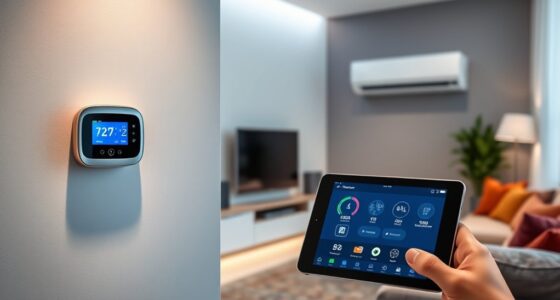Tired of the never-ending cycle of misinformation about heat pump technology? We’ve got you covered.
In this article, we’re going to debunk the myths surrounding heat pumps and their effectiveness in controlling climate. Contrary to popular belief, heat pumps are not inefficient or noisy.
Join us as we explore the truth behind these misconceptions and shed light on the environmental benefits of heat pump technology.
Together, we can separate fact from fiction and pave the way towards a more sustainable future.

Key Takeaways
- Heat pumps are highly efficient, with up to 400% efficiency.
- Modern heat pumps are designed to be quieter and more comfortable.
- Heat pumps can effectively cool in summer and warm in winter.
- Advancements in technology have improved heat pump performance.
The Basics of Heat Pump Technology
As we delve into the topic of ‘The Basics of Heat Pump Technology’, it’s important to understand how this technology works and its benefits for climate control.
Heat pumps are highly efficient systems that transfer heat from one location to another, providing both heating and cooling capabilities. One of the key advantages of heat pumps is their ability to provide energy-efficient heating and cooling, as they can extract heat from the air, ground, or water sources.
There are three main types of heat pumps: air source, ground source, and water source. Air source heat pumps extract heat from the outside air, while ground source heat pumps extract heat from the ground. Water source heat pumps extract heat from a water source, such as a lake or pond.
Each type has its own advantages and considerations, depending on factors such as climate, available space, and installation costs. Understanding the different types of heat pumps allows us to choose the most suitable option for climate control needs.

Common Misconceptions About Heat Pumps
There are many misconceptions about heat pumps, but let’s debunk some of the most common ones.
One of the misconceptions is that heat pumps aren’t efficient. However, heat pump technology has significantly improved over the years, and modern heat pumps are highly efficient. They can provide up to 400% efficiency, meaning that for every unit of electricity they consume, they can produce up to four units of heat.
Another misconception is that heat pumps are noisy. While it’s true that older heat pump models used to be noisy, modern heat pumps are designed with noise reduction features. With advancements in technology, heat pump noise levels have been significantly reduced, making them quieter and more comfortable for users.
How Heat Pumps Control Climate
We can better understand how heat pumps control climate by examining their operating principles and technology. Heat pumps are efficient devices that regulate temperature by transferring heat from one location to another. Here are three key ways in which heat pumps control climate:

Efficiency advantages: Heat pumps are highly efficient as they use electricity to move heat rather than generating it. They can achieve high energy efficiency ratios (EER) and coefficient of performance (COP) values, making them an environmentally-friendly choice for climate control.
Temperature regulation: Heat pumps can both cool and heat spaces, allowing for precise temperature control. They use a refrigerant to absorb heat from indoor spaces and release it outside during cooling mode. In heating mode, the process is reversed, extracting heat from the outdoor air and transferring it indoors.
Understanding how heat pumps control climate helps debunk the myth of inefficient heat pumps.
Debunking the Myth of Inefficient Heat Pumps
Although some people believe heat pumps to be inefficient, we can debunk this myth by examining their actual energy efficiency and performance.

Heat pumps are equipped with energy-saving features that make them highly efficient in providing climate control. For example, they utilize a refrigeration cycle that transfers heat from one space to another, rather than generating heat through combustion. This process consumes less energy compared to traditional heating methods, resulting in significant energy savings.
Additionally, heat pumps can be used for both heating and cooling purposes, further maximizing their efficiency and reducing the need for separate systems. Real-life examples of efficient heat pump usage include residential and commercial buildings that have successfully reduced their energy consumption and costs by adopting heat pump technology.
Exploring the Environmental Benefits of Heat Pumps
Heat pumps offer significant environmental benefits and are a sustainable solution for climate control. These benefits include energy savings, reduced carbon emissions, and the use of environmentally friendly refrigerants.
One of the main advantages of heat pumps is their high efficiency in converting energy into heat or cool air, resulting in lower energy consumption compared to traditional heating and cooling systems. This not only translates to reduced energy costs but also a smaller carbon footprint.

Heat pumps also contribute to reduced carbon emissions because they rely on electricity instead of burning fossil fuels. By using renewable energy sources like solar or wind power to generate electricity, heat pumps can further minimize their environmental impact.
Additionally, modern heat pumps use environmentally friendly refrigerants, such as R-410A, which have a lower global warming potential and ozone depletion potential compared to older refrigerants like R-22.
Addressing Concerns About Noise and Maintenance With Heat Pumps
Noise and maintenance are common concerns with heat pumps, but they can be effectively addressed with proper installation and regular upkeep.
When it comes to noise concerns, heat pumps have come a long way in reducing the amount of noise they produce. Newer models are designed with features like sound-dampening technology and variable-speed compressors, which significantly reduce noise levels. Additionally, heat pumps can be strategically placed in areas that minimize noise disturbance, such as away from bedrooms or soundproof enclosures.

As for maintenance issues, regular servicing and inspections are vital to ensure optimal performance. This includes checking and cleaning filters, inspecting coils and fans, and ensuring proper refrigerant levels. Regular maintenance not only helps prevent potential problems but also extends the lifespan of the heat pump, ensuring it operates efficiently for years to come.
Frequently Asked Questions
Are Heat Pumps Only Suitable for Certain Climates or Can They Work Effectively in All Types of Weather Conditions?
Heat pumps are versatile and can work effectively in all types of weather conditions. Their efficiency is not limited to certain climates. They are designed to provide reliable climate control, regardless of external temperatures or weather patterns.
Can Heat Pumps Be Used as the Primary Heating and Cooling System for a Home or Are They Better Suited as a Supplemental System?
Can heat pumps serve as the primary heating and cooling system for a home? Yes, they can. In fact, heat pumps provide energy-efficient climate control, making them a viable alternative to traditional systems.
Are Heat Pumps Expensive to Install and Maintain Compared to Traditional Heating and Cooling Systems?
Heat pump affordability is often questioned compared to traditional systems. However, when considering installation and maintenance costs, heat pumps can be more cost-effective in the long run due to their energy efficiency and potential for lower utility bills.

Do Heat Pumps Require a Backup Heating Source for Extremely Cold Temperatures?
Yes, heat pumps require a backup heating source for extremely cold temperatures. This is because heat pumps become less efficient in extremely cold weather conditions and may struggle to provide sufficient warmth on their own.
Are There Any Limitations or Restrictions on Where Heat Pumps Can Be Installed in a Home or Building?
When considering installation requirements for heat pumps, it’s important to note that they can be installed in various locations within a home or building. Additionally, heat pumps are known for their energy efficiency and can provide cost-effective climate control.
Are Heat Pumps Truly Effective for Climate Control?
Heat pumps have garnered attention in recent years for their energy-efficient and environmentally friendly qualities. Many are intrigued by their ability to provide both heating and cooling in one compact system. However, there are some startling insights into heat pump technology that may surprise you. These systems can effectively control the climate within your space, offering comfort throughout the year while minimizing energy consumption.
Conclusion
In conclusion, heat pump technology is a game-changer for climate control. Contrary to popular belief, heat pumps aren’t inefficient, but rather highly efficient in providing both heating and cooling solutions.
They also offer significant environmental benefits, reducing greenhouse gas emissions and promoting sustainability.

Addressing concerns about noise and maintenance, heat pumps are designed to operate quietly and require minimal upkeep.
So, don’t be fooled by the myths, heat pumps are the future of climate control!









